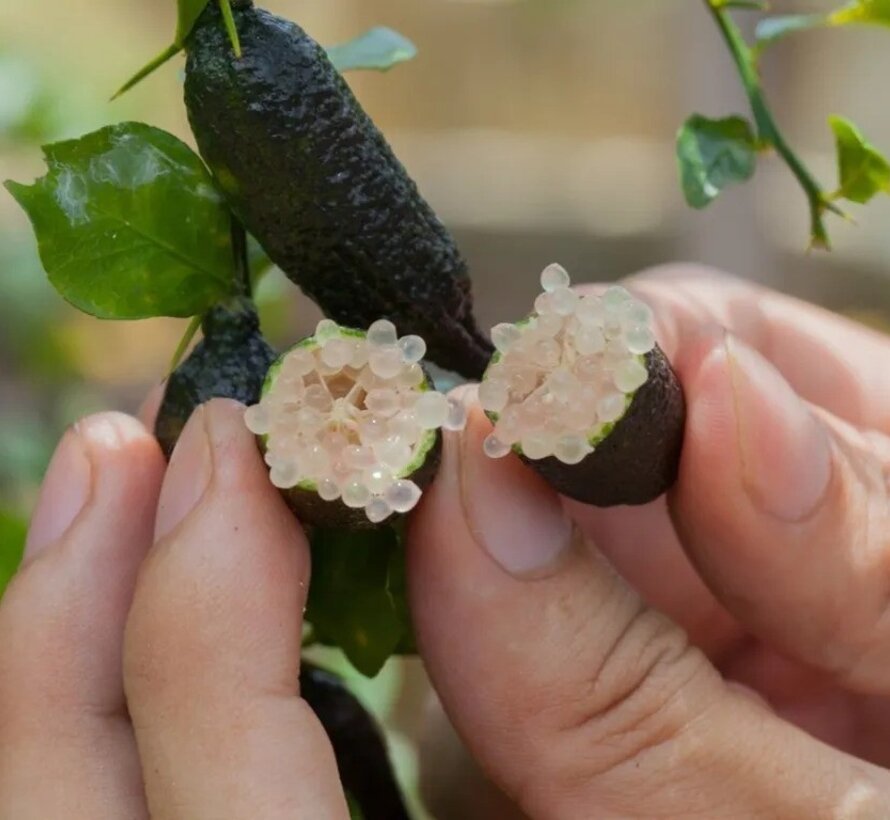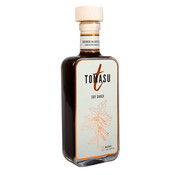Finger lime tree Large
Be aware: please read the notes below at "Shipping"
Known by different names, finger lime is a delicious exotic and rare citrus fruit native to the tropical part of Australia. Especially special because of its characteristic elongated shape and caviar-like flesh. This makes it a special culinary fruit with many wonderful applications.
These trees are grafted onto Volkameriana.
The plant blooms like a normal citrus with delicious, often pink-scented blossoms. The leaves are much smaller than other citruses and the twigs have thorns similar to lemons.
The fruits are 5-10 cm long and 1-2 cm in diameter. When you cut open the peel, the inside is full of caviar-like balls. The fruit is seedless and the flesh can have different colors, depending on the ripening time it can be red, pink, yellow, orange and green in color. It is very aromatic and comparable to the fresh taste of lime, a truly delicious delicacy.
The plant is not winter hardy. (zone 11, +2ºC)
Grow guide
Planting
Plant the tree outside in a sunny, south-facing, sheltered spot in a pot or in a heated greenhouse. Provide loose soil. Clay soils should be mixed with sand to allow for good drainage. In dry conditions, water once or twice a week. The tree does not like constant wet feet.
In a pot, use free-draining compost, extra perlite or bark to improve drainage. Transplant the plant every 1-2 years.
Bloom
When it gets warmer outside, flowering will start. However, most of the flowers will fall off after some time. In this way the plant regulates the maximum number of fruits it can bear. For the first years, it is advisable to remove as many flowers/fruits as possible. This way the plant has more energy to grow. In addition, many of the branches are still too weak to bear fruit.
Maintenance
To promote growth and health, we recommend feeding citrus or olive trees. If you choose a liquid variant, you will administer food more often. Granules need to be administered less frequently. Administer granules in the spring and again in the summer. These are the periods when the plant is most active.
The most common pests are aphids and mites. In a garden with many other plants, natural enemies will be sufficiently present. You can also spray the plant with water and a few drops of dishwashing liquid if these pests get too out of hand.
In the spring all new shoots grow. You can shorten it for its shape for a more compact plant. However, pruning, as with other normal citrus, is less important. It may help to remove crossing branches.
Beware of the sharp spines. These can be removed if they pose a hazard.
Harvest
The plant blooms in the spring. The fruits are ripe in this summer. It is a bit difficult to tell when they are ripe. This is by feeling. Then store the fruits in the refrigerator.
Shipping
The trees are pruned for transport. The trees are then shipped with the utmost care in a large plant box. However, it can happen that a branch breaks. Don't worry, the tree will produce new shoots within a few months.
These are large trees and are therefore sent with a separate DHL shipping service. This usually offers the package twice. If it is not possible to deliver the package in these two times, it will be returned. Most pickup locations will not accept the package.







